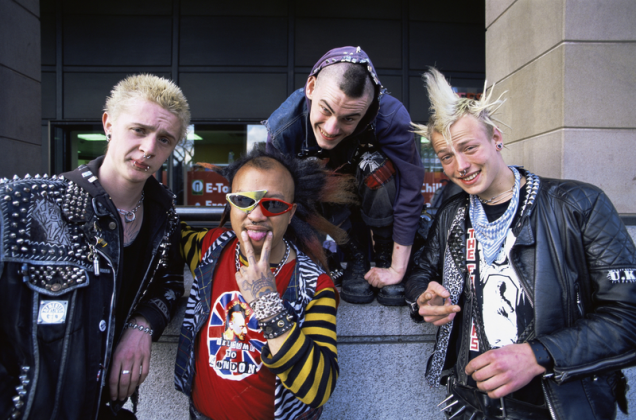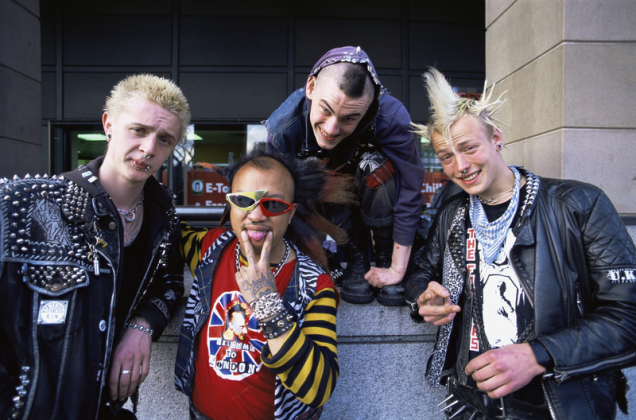Punk rock is celebrating its 40th anniversary. Having been alarmed and disgusted by the scene at its birth in 1976, the British establishment is now embracing it with a year-long celebration called Punk London: 40 Years of Subversive Sub-Culture.
I remember punk very well, although I wasn’t part of it – I was only nine years old in 1976. But some of the older kids I knew were in punk bands, and tried to get away with wearing safety pins in their ears. I certainly remember seeing the Sex Pistols and the Stranglers on TV. They were scary.
The term “punk” came from US prison slang and meant something like “delinquent” or “trash” – although it had a darker origin as a word for the same-sex partner, consenting or otherwise, of an inmate. By the early 70s it was already associated with raw garage rock bands like the New York Dolls and Iggy & The Stooges.
But here’s the shameful secret of the Sex Pistols and British punk: they were a product of marketing.
The story began with a duo called Malcolm McLaren and Vivienne Westwood, who were running a fashion boutique named SEX on London’s Kings Road. McLaren was a former art student; Westwood had progressed from making clothes for rock and roll fans to something more original, designing fetish-inspired garments daubed with provocative political slogans.
Having spent time in New York and observed the nascent punk scene at first hand, McLaren became interested in a rough-and-ready London band called the Strand, who often hung out at the store. Soon he’d become their manager.
Under McLaren’s guidance, the band changed their name to the Sex Pistols and recruited John Lydon, who they’d spotted on the street. With his green hair and ripped t-shirt, he was hard to ignore. Lydon’s energy and aggressive sartorial style made him the ideal front man, especially in his new incarnation as Johnny Rotten. Dressed by Westwood and artfully packaged by McLaren, the band toured colleges and pubs, building a fan base through sheer anarchic enthusiasm.
The Pistols didn’t just perform: they strutted and leapt, they smashed their gear, they jumped down into the audience, they literally spat on their fans and the fans loved it. They swore like the rest of us breathed. Meanwhile, McLaren arranged professional photo sessions and one of his art school friends designed posters using the now iconic “cut up” lettering.
As McLaren had predicted, once the media discovered the band, they couldn’t get enough of them. Outrage equalled front page. England was falling apart, suggested the conservative press, and the Pistols had crawled out of the cracks. The media’s promotion of the punk phenomenon was the very essence of the phrase “there’s no such thing as bad publicity”.
But if the Pistols were, in part, a McLaren creation, the movement they spawned was authentic. England languished in the depths of a recession, and the streets were full of unemployed youth who had nothing better to do than grab a guitar and screech out their frustration. Couldn’t play? Didn’t matter – the Pistols had shown that it was about attitude, not talent.
By 1979 the Pistols had already split up, but punk had scratched a ragged mark on the history of rock music. In a sense it was a short-lived movement: the New Romantic bands I listened to in the 1980s showed barely a trace of rebellion. As the music magazine Smash Hits frequently commented at the time, “It’s like punk never happened.”
So what’s left of punk today, apart from nostalgia trips like the current 40-year anniversary? If punk was a democratic movement, in which anybody could become famous with a few cheap instruments and a convincing image, we’re all punks. Podcasts, blogs, Instagram photos, YouTube videos – these are the tools with which we can force the world to take notice, if we have a little talent. Snapchat, in particular, with its deliberately crude and juvenile feel, captures something of the essence of punk.
Punk itself has lost the power to shock. Seen from today’s perspective, it looks at worst crude, at best charmingly naïve. In a world where politicians routinely text photos of their sexual organs to young women, the Sex Pistols look like harmless fun-loving youngsters. These days, if you want to terrify your parents, you have to book a one-way flight to Syria.
So if one day my son decides to pick up guitar and stick a safety pin through his ear, he won’t hear any protests from me. At least it’ll seem as though punk is still happening.





